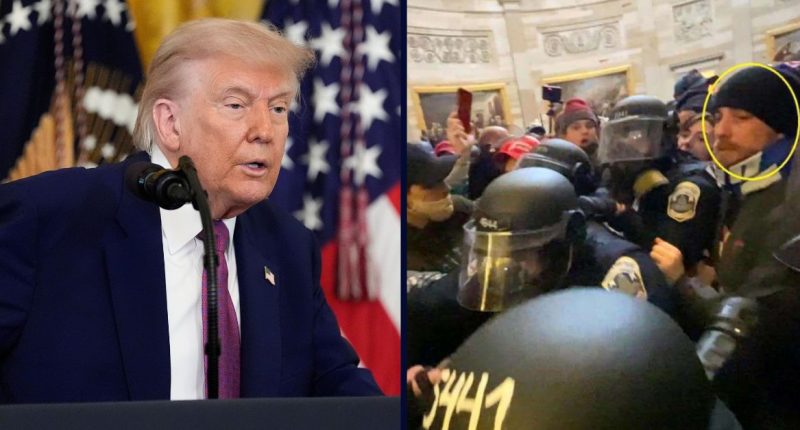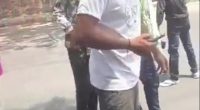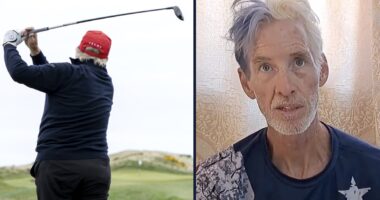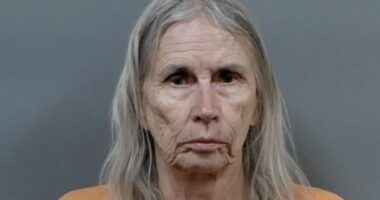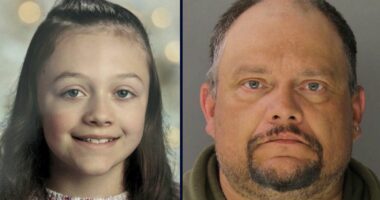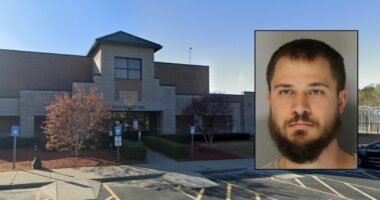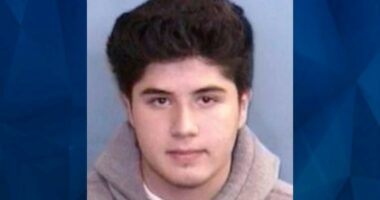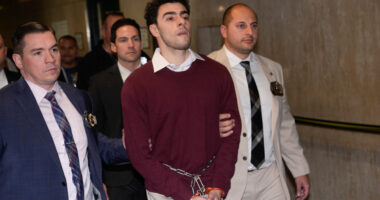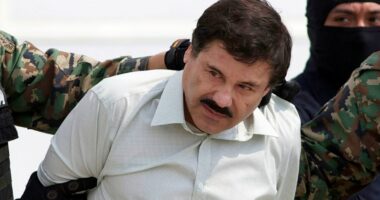Share this @internewscast.com
Left: President Donald Trump delivers remarks after signing legislation that blocks California’s rule prohibiting the sale of new gas-powered vehicles by 2035, in the East Room of the White House, Thursday, June 12, 2025, in Washington (AP Photo/Alex Brandon). Right: Kyle Colton at the U.S. Capitol on Jan. 6, 2021 (U.S. Department of Justice).
A former Jan. 6 defendant is requesting a federal judge in California to consider President Donald Trump’s mass pardon applicable to a related yet separate child pornography case.
This request aligns with several motions filed in recent months by other individuals ensnared by law enforcement after their initial arrests for involvement in the pro-Trump riots at the U.S. Capitol on Jan. 6, 2021.
Kyle Travis Colton, 38, was arrested in December 2023 and charged with five counts in a 15-page criminal complaint and statement of facts after he allegedly told passengers on a flight from Washington, D.C., to Los Angeles “that he was part of the ‘second wave’ of rioters.”
Then, in February 2024, Colton was charged in a four-page sealed indictment with one count of receipt of child pornography for allegedly receiving “one or more visual depictions” within interstate commerce “where the production of such visual depiction involved the use of a minor engaged in sexually explicit conduct.”
Love true crime? Sign up for our newsletter, The Law&Crime Docket, to get the latest real-life crime stories delivered right to your inbox.
The criminal complaint is largely made up of still images from surveillance and body-worn camera footage at the national seat of legislative government that fateful day. Investigators placed the defendant in multiple rooms and hallways amid the chaos.
The heart of the allegations against him were:
Review of the body worn camera (BWC) video from Metropolitan Police Department (“MPD”) officers in the Rotunda revealed COLTON not obeying orders by the officers to leave the Rotunda and COLTON standing in line with rioters as these other rioters had confrontations with the officers. These officers had initiated crowd clearing measures to include forming a police line, giving loud verbal commands, and using batons to move persons towards the exit door. COLTON only moved when the crowd was physically pushed towards the exit. Furthermore, COLTON remained standing side-by-side with these other rioters who were combating law enforcement officers. At one point COLTON grabbed a flagpole that was being used by a rioter to assault MPD Officer K.D. COLTON gained control of the flagpole, which Officer K.D. had also grabbed, and then gave it back to this rioter, who then fled into the crowd of rioters with the flagpole[.]
In October 2024, Colton pleaded guilty to one count of disorderly and disruptive conduct in a restricted building or grounds. He faced a maximum sentence of one year in prison and a $100,000 fine.
Gone were initial charges of obstruction of law enforcement during civil disorder, knowingly entering or remaining in any restricted building or grounds without lawful authority, disorderly conduct on Capitol grounds, and parading, demonstrating, or picketing in a Capitol building – replaced by a 1-count information in September 2024.
The defense and the prosecution submitted dueling sentencing memos in early January; Colton’s sentencing hearing was, somewhat fortuitously, slated for Jan. 21. The day before that, of course, the 45th and 47th president issued blanket pardons to all Jan. 6 defendants.
Later that same day, U.S. District Judge Randolph D. Moss, sitting in Washington, D.C., signed off on the government’s motion to dismiss.
Meanwhile, and as noted in the 12-page plea agreement, the child pornography charge lingered in the Eastern District of California.
Now, Colton insists the investigation that led to his child pornography charge was inextricably tied up in the Jan. 6 case against him.
The pardon itself purports to cover “offenses related to events that occurred at or near the United States Capitol,” the defendant’s attorneys note in a two-page motion to dismiss based on the pardon. This means the laptop computer cited in the child pornography indictment cannot be relied upon because it was recovered during the investigation into Colton’s Jan. 6-related actions, according to the motion to dismiss.
“The fact that this Court has held that the search warrant for January 6th evidence violated the Constitution by being issued without probable cause as to the computer shows how closely related this Sacramento investigation and charges were to what President Trump believed were excessive prosecution of persons like Mr. Colton who committed misdemeanor trespasses,” the motion reads. “Mr. Colton pled guilty and expressed remorse for his conduct on January 6th, but his child pornography case is not the typical case where a defendant is found because he was distributing or sharing. This indictment is based only on evidence found in an investigation which was looking for a conspiracy which did not exist.”
In April, the judge overseeing the child sex abuse material case denied a motion to suppress the evidence in its entirety – but acknowledged the government lacked probable cause to search Colton’s computer. Still, the court allowed the evidence to be used to support the charge based on the “good faith exception” to the exclusionary rule – a function of often-complex Fourth Amendment jurisprudence.
To bolster his case, Colton notes the U.S. Department of Justice has, at least in some other instances, taken similar positions.
“Subsequent to January 20, 2025, the Department of Justice has taken the position that indictments which are based only on evidence that was discovered pursuant to a search warrant for January 6th evidence are ‘related to events that occurred on or near the United States Capitol on January 6, 2021,”” the motion to dismiss reads.
But that record is mixed.
On June 7, a federal judge in Baltimore applied Trump’s pardon to man’s gun charge that stemmed from the Jan. 6 investigations.
Yet, on the very same day, another judge in Tennessee did the exact opposite — denying a man’s request to dismiss a firearms case by finding it “entirely unrelated” to Jan. 6.
